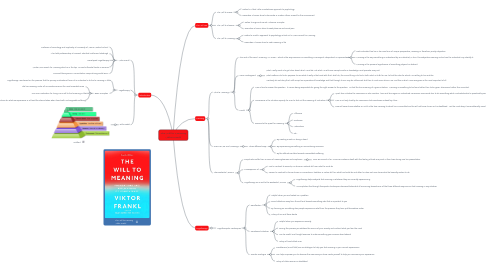
1. Introduction
1.1. Victor Frankl
1.1.1. Professor of Neurology and Psychiatry at University of Vienna Medical School
1.1.2. Also held professorship at Harvard, Stanford, Dallas and Pitsburgh
1.1.3. Developed Logotherapy
1.1.4. Wrote Mans Search for Meaning which is in the top 10 most influential books in america
1.1.5. Survived three years in concentration camps during world war 2
1.2. Logotherapy
1.2.1. Logotherapy: was based on the premise that the primary motivational force of an individual is to find a meaning in life.
1.2.2. Basic Principles
1.2.2.1. Life has meaning under all circumstances even the most miserable ones
1.2.2.2. Our main motivation for living is our will to find meaning in life
1.2.2.3. We have freedom to find meaning in what we do, what we experience or at least the stance taken when faced with unchangeable suffering
1.3. Dilts model
1.3.1. Untitled
2. The Will to Meaning Viktor Frankl
3. The Will Too
3.1. The Will to Power
3.1.1. Refers to Alfred Adler's Nietzchean approach to psychology
3.1.2. Describes a human drive to dominate or master others, oneself or the environment
3.2. The Will to Pleasure
3.2.1. Refers to Sigmund Freuds "Pleasure Principle"
3.2.2. Describes a human drive to seek pleasure and avoid pain
3.3. The Will to Meaning
3.3.1. Refers to Frankl's approach to psychology as laid out in Mans Search for Meaning
3.3.2. Describes a human drive to seek meaning in life
4. Meaning
4.1. What is Meaning?
4.1.1. The root of the word "meaning" is "mean", which is the way someone or something is conveyed, interpreted, or represented.
4.1.1.1. Each individual has his or her own form of unique perspective; meaning is, therefore, purely subjective.
4.1.1.2. Meaning is the way something is understood by an individual; in turn, this subjective meaning is also how the individual may identify it.
4.1.1.3. Meaning is the personal significance of something physical or abstract.
4.1.2. Soren Kierkegaard
4.1.2.1. What I really need is to get clear about what I must do, not what I must know, except insofar as knowledge must precede every act. What matters is to find a purpose, to see what it really is that God wills that I shall do; the crucial thing is to find a truth which is truth for me, to find the idea for which I am willing to live and die. I certainly do not deny that I still accept an imperative of knowledge and that through it men may be influenced, but then it must come alive in me, and this is what I now recognize as the most important of all.
4.1.3. Frankl
4.1.3.1. Man is free to answer this question. It means being responsible for giving the right answer to the question. To find the true meaning of a given situation. Meaning is something to be found rather than to be given, discovered rather than invented.
4.1.3.2. Conscience is the intuitive capacity for man to find out the meaning of a situation.
4.1.3.2.1. Apart from intuitive the conscience is also creative. time and time again an individuals conscience commands him to do something which contradicts what is preached by society.
4.1.3.2.2. Man is not only lead by his conscience but sometimes mislead by it too..
4.1.3.2.3. One will never know whether or not it is the true meaning to which he is committed and he will not know it even on his deathbed.. But he must obey it unconditionally even though he is aware of the possibility of error.
4.1.3.3. Barriers to the quest for meaning
4.1.3.3.1. Affluence
4.1.3.3.2. Hedonism
4.1.3.3.3. Materialism
4.1.3.3.4. etc..
4.2. How Can We Find Meaning?
4.2.1. Three different ways
4.2.1.1. By creating a work or doing a deed
4.2.1.2. By experiencing something or encountering someone
4.2.1.3. By the attitude we take towards unavoidable suffering
4.3. The Existential Vacuum
4.3.1. People who suffer from a sense of meaninglessness and emptiness
4.3.1.1. Over 80 Percent of an American audience dealt with this feeling at least one point in their lives during one live presentation.
4.3.2. Consequence of
4.3.2.1. First in contrast to animals; no drives or instincts tell man what he must do
4.3.2.2. Second in contrast to former times no conventions, tradition or values tell him what he should do and often he does not even know what he basically wishes to do
4.3.3. Logotherapy as an aid to the Existential Vacuum
4.3.3.1. Logotherapy helps subjects find meaning in whatever they are currently experiencing
4.3.3.2. Accomplishes this through therapeutic techniques discussed below but all are aiming towards one of the three different ways we can find meaning in any situation
5. Logotherapy
5.1. Logotheraputic Techniques
5.1.1. Dereflection
5.1.1.1. Helpful when you are fixated on a problem
5.1.1.2. Divert attention away from the self and towards something else that is important to you
5.1.1.3. By focusing on something else people experience relief from the pressure they have put themselves under
5.1.1.4. *Story of me and these books
5.1.2. Paradoxical Intention
5.1.2.1. Helpful when you experience anxiety
5.1.2.2. During this process you address the source of your anxiety and confront what you fear the most
5.1.2.3. Can be useful as a thought exercise to make something your anxious about absurd
5.1.2.4. *Story of heart attack man
5.1.3. Socratic Dialogue
5.1.3.1. Practitioners (or self talk) can use dialogue to help you find meaning in your current experiences
5.1.3.2. Can help empower you to discover the resources you have inside yourself to help you overcome your experience
5.1.3.3. *Story of older woman on deathbed
